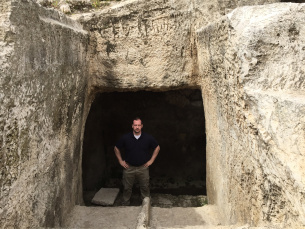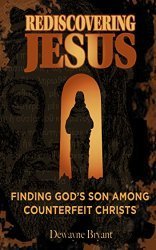Dewayne Bryant's Blog, page 15
May 1, 2015
Christianity: No Intellectual Slackers Need Apply
 C.S. Lewis once said, “God is no fonder of intellectual slackers than of any other slackers. If you are thinking of becoming a Christian, I warn you, you are embarking on something which is going to take the whole of you, brains and all.”
C.S. Lewis once said, “God is no fonder of intellectual slackers than of any other slackers. If you are thinking of becoming a Christian, I warn you, you are embarking on something which is going to take the whole of you, brains and all.”
The New Testament makes it clear that Christians are to be thoughtful, cogitative��people. The apostle Paul carefully reasoned with others in presenting the gospel (Acts 17:2). The apostle Peter states that we should give a proper defense of the faith (1 Peter 3:15). This includes (1) a knowledge of the subject matter, (2) knowing how to present it effectively, and (3) anticipating potential objections.
The desperate need for critical thinking can��be illustrated in any five minutes of a news program. Interviewees often��cannot give a straight answer to questions posed to them. At times, their arguments are weak or emotionally-driven. Unchallenged diversions, deflections, and equivocations are commonplace. People��can��make��themselves look incredibly foolish simply by not paying attention to how they structure their arguments. Some–especially politicians, as we have seen in the last few years–cleverly dodge difficult questions and offer silky smooth answers that do not answer the questions posed to them. This may be true in politics, but it is especially true in the realm of religion.
There are many statements used against authentic Christianity–by unbelievers and religious non-Christians–that are pulled from��the wasteland��of the ridiculous. For instance:
“Everything is relative.”��Do you realize that’s an absolute statement?��
“There is no such thing as absolute truth.”��Do you realize��that’s another absolute statement?
“All truth is relative.”��Third time’s a charm.
“We can’t know anything for certain.”��Really? You seem quite certain.
“Nothing can be known.”��How do you know?
“It is arrogant to think that you can know the truth with certainty.”��You seem��pretty confident in saying��that.��
“Christianity might be true for you, but it isn’t true for everyone.”��Is your relativism true only for you, or do you think it’s true for everyone?
“God is indescribable.” Umm, that IS��a description.
“Only scientific arguments are valid.”��That’s a philosophical statement.��
“There is no such thing as propositional truth.”��You just gave an example of it.
“Only knowledge that is empirically verifiable can be considered true.”��Can you verify that statement empirically?
“We have to doubt all truth claims.”��Did you doubt that one?
“You shouldn’t judge.”��That sounds like a judgment.
“That’s just your opinion.”��No, it’s your opinion that this is��my opinion.
“It’s arrogant to tell someone else that they’re wrong.” Aren’t you doing exactly that?��
“You should be tolerant of all views.” You clearly aren’t tolerating mine.��
“You can’t��force your views on others.” In other words,��I can totally ignore you.
It isn’t always easy spotting errors in thinking when they appear. Sometimes they’re sneaky. And sometimes we hear something so often that it just “sounds right.”��Since current��educational models��often value social skills over critical thinking skills, it isn’t a great surprise that many people routinely include blatant contradictions and self-refuting statements in everyday language.
As Christians, we have to be careful in not only what we believe, but how we present those beliefs. We have to do so with language that is clear, consistent, and coherent. Otherwise, we’ll be nothing more than the learned fool, who, according to Benjamin Franklin, “writes his nonsense in better language than the unlearned, but it is still nonsense.”
Image courtesy of num_skyman��/ FreeDigitalPhotos.net


April 23, 2015
Baptism in First Century Jerusalem

A mikveh��near the base of the��Southern Steps��of��the Temple Mount in Jerusalem.
Many people today have questions about baptism. Is it really necessary? And if so, by what method? With a great deal of confusion in our religious world concerning baptism, it is helpful to see how it was performed in the first century.
As indicated by the New Testament, baptism was first administered��by immersion – this is what the term baptize means.��This was not a radical invention; Jews had engaged in ritual immersion long before Christ’s birth. They used��mikva’ot (singular mikveh), or ritual bathing pools. They were square in shape and equipped with a set of steps by which a person could access the water.��Some��mikva’ot��were small. Others were much larger, more than capable of accommodating an adult.
The Greek word baptizo means to plunge, dip, or submerge.��There would be little��question about this fact if English translators had chosen to��translate��the term��rather than transliterate it. This decision permitted the continuation of methods already in use�� that had developed over time, such as sprinkling and pouring.
In the first century, baptism was considered indispensable. This is reflected in the writings of some of the early church fathers. For example, Tertullian called Christians were “little fish” because they were “born in water” (De Baptismo, 17). In time,��other methods began to be used. This may have begun in order to accommodate those who did not have adequate availability to the proper facilities. Today, sprinkling and pouring remain as popular methods. Some, recognizing the need for water but exercising greater flexibility, go even farther. I once knew a Presbyterian minister during my time in seminary who “baptized” a man by dipping his thumb into a cup of water and then placing it on the man’s forehead.

Another mikveh near the Southern Steps��of the Temple Mount.
The question inevitably arises, “If baptism was by immersion only, how were 3000 people baptized on Pentecost?” To put it simply, mikva’ot��were everywhere in Jerusalem. Archaeologists have discovered well over��one hundred of them in Jerusalem, with nearly forty within a stone’s throw of the Temple Mount. We have to remember that these pools were for both inhabitants of Jerusalem and pilgrims. This is in addition to��the��mikva’ot that were part of every synagogue. Additionally, the��mikva’ot at the Temple Mount were fed by nearby cisterns which, in turn, were fed by aqueducts so that the pools would have plenty of water.
Jewish believers took ritual purity very seriously. In pictures of��mikva’ot, we might notice that there is often a stone dividing line going down the middle of the pool’s staircase. This was to ensure that the ceremonially unclean person did not ascend the same way in which he had entered the��mikveh. The distinction between clear and unclean was crystal clear – a person descended down one side of the steps and ascended the other.

A large mikveh near the southern end of the Western Wall.
Some today may be tempted to think that people make too much of baptism. They disagree that baptism is necessary, citing passages stating that salvation does not consist of works (Eph. 2:9). Here they equate baptism with some kind of meritorious work. Scripture does not define it this way. Instead, it is merely the final act of faith in which one demonstrates his or her commitment to Christ. And its importance is emphasized by Luke, who was careful to record baptism as a part of every conversion experience in the book of Acts.
We might look at another example. If the man born blind had never washed his eyes at the pool of Siloam per Jesus’ instructions, would his eyesight have been restored? Personally, I don’t think so. What if he had washed in some other body of water? Jesus didn’t command him to do that. Jesus gave him specific instructions. If the man had not obeyed, then we have no reason to think that he would have been able to see again.
The offer of sight was a free gift, as long as a specified conditions was met: the man was to wash his eyes in the pool of Siloam. Does this mean the man earned his sight? Of course not. Similarly, salvation in the New Testament has its own conditions. Everyone–excepting the universalists–agrees that faith is a requirement; this is beyond dispute. For those who insist that baptism is necessary, this is merely part of the requirement��of faith, as the Bible makes abundantly clear.


April 7, 2015
The Bible Lands Project Is Just Beginning!
I was privileged to participate in a video project in Israel recently. The result will be a number of lessons titled, “Faith Lesson in Bible Lands.” I’m very thankful for all who participated, and especially the guys responsible for video and photography. I will be eagerly waiting to share the details concerning the finished product, which is being produced through World Video Bible School. Please take a moment to read all about this fantastic project and imagine all the great things it’s going to accomplish!
 Originally posted on WalkingWhereJesusWalked:
Originally posted on WalkingWhereJesusWalked:
During Jesus��� final earthly days, He made His way from Jericho back toward Jerusalem, knowing the ���brood of vipers��� that He would face there. Luke 19 records how He drew near to Bethany, and acquired a colt to carry Him the rest of the way. As the colt must have carefully picked its way down the steep face of the Mount of Olives, into the narrow Kidron valley, and back up the equally steep face of the Temple Mount, people laid their cloaks in the path in front of Him in a gesture of honor and respect, rejoicing and loudly praising God, saying ���Blessed is the king who comes in the name of the Lord! Peace in heaven and glory in the highest!��� Pharisees in the crowd wanted Jesus to rebuke His disciples, but He said ���I tell you, if these were silent, the very stones would cry out!���
View original 3,775 more words

December 14, 2014
Exodus: Gods and Kings – A Review
 Bible-based movies tend to do very well at the box office. Polls show that one important consideration for viewers is biblical accuracy, however. I used to think that The Ten Commandments was notorious for its inaccuracies, both biblical and Egyptological. As of last night, I have found a new champion: Exodus: Gods and Kings.
Bible-based movies tend to do very well at the box office. Polls show that one important consideration for viewers is biblical accuracy, however. I used to think that The Ten Commandments was notorious for its inaccuracies, both biblical and Egyptological. As of last night, I have found a new champion: Exodus: Gods and Kings.
As someone who loves ancient Egypt and the Bible, I was excited to see the movie. Unfortunately, Exodus was a disappointment of biblical proportions. Lou Lemenick at the New York Post gave the film one star (out of four), calling it ���an utterly clueless, relentlessly grim and rambling action epic guaranteed to displease devout Jews, Christians and Muslims alike, amuse atheists ��� and generally bore everyone.���
Christian Bale turns in a decent performance. He is detached and wooden in spite of his obvious talent as an actor. I did have some reservations about Batman being Moses. He��does have a few gravelly-voiced lines that are reminiscent of his dialogue in the Christopher Nolan films. Oh, and he is a warrior. Not just any warrior ��� Moses is a one-man wrecking machine. In one scene, he dodges an arrow with relative ease while simultaneously cutting down several Hittite soldiers. Think about Russell Crowe in Gladiator (another Ridley Scott film) who has a cool beard and talks like Bruce Wayne/Batman. That’s Moses.
Australian actor Joel Edgerton plays the part of Ramesses. For those who have seen Cecil B. DeMille���s classic, it���s hard to imagine anyone doing a better job than Yul Brynner in that role. Brynner didn���t just play the part of Ramesses; he was Ramesses. Edgerton���s performance is flat and uninspiring. We never really know what to make of the character because he���s just kind of lifeless.
There are different kinds of bad guys. There are the misunderstood ones with whom you sympathize. There are the accidental ones you pity. There are the truly evil ones for whom you have nothing but unmitigated contempt. Edgerton doesn���t come across as any of these. Ramesses is envious, cowardly, dour, and brooding. Half of the time he doesn���t seem to know what in the world he���s supposed to be doing. Even when he���s going after the Hebrews before the parting of the Red Sea he seems kind of feckless. He pushes out some rather emotionless and forced dialogue, almost like he���s struggling with some kind of intestinal problem after drinking a goblet full of funky water from the Nile.
In the movie, God is petulant and vindictive. Forget the great ���I am��� statement from Exodus 3 (which happens to be one of the most important chapters of the entire Bible) ��� Scott relegates it to a cinematic footnote. God is portrayed as an 11-year-old child, and he has about the same level of maturity. Bale said in an interview that he viewed God as ���mercurial.��� If the Exodus script is all he had to work with, I can see where he got that impression.
The exodus was the gospel of the Hebrew Bible. It would come up again in the messages of the prophets. Over and over, God���s spokesmen would preface their message with ���Thus says the Lord, who brought you out of Egypt …��� God chose his people, saved them, and led them to a land of plenty. In the Bible, we have a God of unparalleled generosity, whose concern for his people is unmistakable, and whose fidelity is unquestionable. This is not Scott���s God.
One of the criticisms of the movie is that it is ���whitewashed��� ��� it features white actors in roles that should properly be filled by actors of non-European descent. In a perfect world, the lead roles should have properly gone to actors of Middle-Eastern descent, or something close to it. I read a number of articles online describing how the movie was racist. That term is grossly abused in our society–really, it’s often used as a bludgeon in the absence of intelligent dialogue–and I resolutely disagree with applying it to the film. That having been said, the movie was indeed miscast. Regardless, Scott defended his decision by arguing that he needed star power to help get investors to support the movie. After seeing the movie, he probably needed all the help he could get. But we can���t forget that this has been done in other films as well.
We might think of the newest Hercules, in which Dwayne ���the Rock��� Johnson stars in the titular role. Apparently they couldn���t find a Caucasian actor (Greek, specifically) with the size to play Hercules, so they went with the Rock ��� a man-mountain with half-Samoan, half-black ancestry. Similar considerations went into the selection of the late Michael Clarke Duncan as the Kingpin in the 2003 movie Daredevil (the Kingpin is a physically imposing Caucasian villain in Marvel comics). We could also think of the recently-announced cast of the Suicide Squad, in which Will Smith will be playing the role of Deadshot, a Caucasian character who is a frequent enemy of the Batman in DC comics. When it comes to ethnicities of all kinds, we can see that Hollywood directors frequently depart from the source material when casting their lead roles. Exodus isn���t that much different, although I believe it should have been more authentic and accurate in its casting.
Speaking of accuracy, there isn���t much to be had when it comes to the script���s fidelity to the biblical text and to ancient history. Here are some of the problems with the movie:
One scene appears to show a pyramid under construction. The last pyramids in Egypt were built about three to four centuries before the birth of Moses.
Battle scenes show Egyptian cavalry, a type of unit that would not have been seen at this time.
Moses kills an Egyptian (almost two) after a case of mistaken identity rather than because he is abusing one of the Hebrews.
The movie offers a unique explanation for the first plague: the Nile runs red after all the crocodiles go crazy and tear each other apart en masse.
Moses cries out to God that he will not be humbled, when Numbers12:3 says that he��was one of the most humble people on earth.
The Egyptian temple at Abu Simbel appears on the wrong end of Egypt (literally), over 1,000 miles from where it was originally located.
One of the advisers encourages Pharaoh to explain the plagues as the result of natural phenomena. This kind of anachronistic concern didn���t appear until many centuries later.
Another anachronistic detail is when Ramesses states that he can���t let the Hebrews go because ���From an economic standpoint, what you���re asking is problematic at least.��� History knows Ramesses II as a great general and a great liar. Apparently, we can now add ���world’s first economist��� to his resume.
The dialogue is plagued by modern clich��s and concerns. Moses wants his son Gershom to grow up ���believing in himself,��� while Zipporah says that the child can choose his own beliefs.
Moses has to carve the Ten Commandments onto the stone tablets himself.
The ���big reveal��� when Ben Kingsley���s character Nun relates the facts about Moses��� true parentage has a distinct feel of The Matrix.��Nun says to Moses: ���You know something���s wrong. You���ve always felt it��� (Morpheus says to Neo: ���You���ve felt it your entire life. There���s something wrong������).
A review at ChristianityToday.com gave the movie three stars out of four. The reviewer clearly enjoyed it, given the amount of time he spends gushing about what he considers to be its positive qualities. He also compares Christian audiences to Ramesses as potentially ���stubborn, grumpy, vengeful, closed-minded and unwilling to listen to someone they���ve already decided is an enemy.��� I first thought was, ���Is he trying to preempt any disagreement with his glowing review by shaming others who didn���t share his view of the film?��� Similar attitudes could be seen in some Christian’s responses when the Noah movie was released earlier this year. It’s almost as if they are saying, “Regardless of how badly it portrays biblical events, we��have��to see the good in it because it will have non-believers talking about it!” Sorry, but the God of��Exodus: Gods and Kings doesn’t really have much worth talking about.
The film did have positive aspects. The sets, effects, and costumes are fantastic. One scene showing the Hebrew making bricks looks like it was taken straight out of the tomb of the 15th century Egyptian vizier Rekhmire (which has a scene showing brickmakers at work). The plagues, although much briefer than expected, really come to life on the screen.
If you���ve got twelve dollars and two hours to burn, take your better half out to dinner. Or buy something for your kids. Perhaps you could donate the cash to charity. If none of that appeals to you, then go watch Exodus: Gods and Kings.

December 12, 2014
Surviving Exodus
 In anticipation of the movie Exodus: Gods and Kings, Animal Planet aired a program titled, ���Surviving Exodus.��� For some reason, I assumed that it would be historically- or archaeologically-oriented (perhaps because archeologist Robert Cargill was interviewed extensively in the program). It wasn���t quite what I expected, and that isn���t a bad thing. It was actually a re-creation of the biblical plagues. Clips of the upcoming movie were interspersed throughout the program, which showed survival experts attempting to weather each plague as it was reproduced under controlled conditions.
In anticipation of the movie Exodus: Gods and Kings, Animal Planet aired a program titled, ���Surviving Exodus.��� For some reason, I assumed that it would be historically- or archaeologically-oriented (perhaps because archeologist Robert Cargill was interviewed extensively in the program). It wasn���t quite what I expected, and that isn���t a bad thing. It was actually a re-creation of the biblical plagues. Clips of the upcoming movie were interspersed throughout the program, which showed survival experts attempting to weather each plague as it was reproduced under controlled conditions.
The destruction wrought by the ten plagues cannot be overestimated. To see the suffering and devastation each plague could bring upon Egypt in ���Surviving Exodus��� was both fascinating and sobering. It is difficult to imagine being unable to evade the invasive swarms of frogs and flies; to be unable to move without being ravaged by the searing pain from boils covering your skin; to vainly attempt to escape hailstones falling from the sky at a rate of speed that could approach 100 miles an hour; to see a swarm of locusts each as much food as a city of 100,000 residents. The plagues were no mere inconvenience. They were judgment.
I���m looking forward to seeing the movie and writing a review for it. The effects should be spectacular. I only hope that it, unlike the Noah movie earlier this year, accurately preserves the biblical message. Hollywood films tend to provide stunning visuals, yet find a way to deplete the biblical message of its power when translating it to the big screen.
Image courtesy of James Barker��/ FreeDigitalPhotos.net

December 10, 2014
Ignorance of the Bible
 When we look around at our world today, there is a terrible ignorance of the Bible. As our society seems to be getting more secular, we should find that the general knowledge of the Bible will be getting worse. Once upon a time, knowing the Bible was considered to be an important part of a person���s education. If you didn���t know the Bible, you simply could not claim to be an educated person. Times have changed quite a bit.
When we look around at our world today, there is a terrible ignorance of the Bible. As our society seems to be getting more secular, we should find that the general knowledge of the Bible will be getting worse. Once upon a time, knowing the Bible was considered to be an important part of a person���s education. If you didn���t know the Bible, you simply could not claim to be an educated person. Times have changed quite a bit.
Many Christians have a knowledge of the Bible that may be lacking. They may know what they believe, but not why they believe it. They may be something like the country preacher who was being interviewed for a preaching position. The elders asked the young man what his favorite parable was. He replied, ���The parable of the Good Samaritan.��� They asked if he would mind explaining it to them. With a beaming smile he answered:
Once there was this man traveling from Jerusalem to Jericho.��And he fell among the thorns.�� And the thorns sprung up and choked him.
And as he went on, he didn���t have any money and he met the queen of Shiva.��She gave him a thousand talents of gold and a thousand changes of raiment.��Then he got onto a chariot and drove furiously.��When he was driving under a big juniper tree, his hair caught on the limb of that tree and he hung there many days. And the ravens brought him food to eat and water to drink.��And he ate 5,000 loaves of bread and 2 fishes.
One night, as he was hanging there asleep, his wife Delilah came along and cut off his hair.��And he dropped and fell on a stony ground.��But, he got up and went on and it began to rain for 40 days and 40 nights.��So, he hid himself in a cave and lived on locusts and honey.
Then he went on and met a servant who said, ���come, let���s have a supper together.�����But, he made an excuse saying, ���no I won���t, I married a wife and I can���t go.�����And the servant went out to the high ways and hedges and compelled him to come in.
After supper, he went down to Jericho.��And when he got there, he looked up and saw that old queen Jezebel sitting down, high up on that window.��She laughed at him and he said, ���throw her down out there.�����And they threw her down.��And then he said throw her down again.��And they threw her down 70 times 7.
And of the fragments that remained, they picked up 12 baskets full, besides women and children. And they said, ���blessed are the piece makers.��Now who���s wife do you think she will be in that judgment day?���
If this were a real story, we could be certain that our poor, confused preacher wouldn���t have gotten the job. It is just as unlikely that with such a gross misunderstanding of Scripture he would have been able to do much good in a congregation anyway. But an understanding of the Bible is not just the sole concern of elders, deacons, and ministers. It is the concern of every Christian.
What if Christianity suddenly were run like a business and gross ignorance of God���s Word were a fireable offense? How many Christians would keep their jobs more than a month? More than a week? Not as many as claim to be faithful believers. We have gotten used to living in a Christian nation, being part of a Christian society, and having Christian friends. But times have changed. We are now in a post-Christian society. And that means knowing God���s Word is more important than ever ��� not just to defend and promote the gospel, but also to help others understand it, and correct them when they misunderstand it.
Misunderstanding the Bible can lead to disastrous consequences. Some think that they can work their way to heaven. Others think that baptism is not important. Still others think you can make a profession of faith, secure your place in eternity, then go and live however you want. I dread what eternity holds for those who believe these things. The Bible makes it clear that Christ secured the offer of salvation for all of us at the cross. Through baptism we can access the power and forgiveness freely offered through his sacrifice. The question is not just do we know what the Bible says, but are we going to accept it as truth and put it into practice in our lives?

September 20, 2014
Web Resources for Ministers
 I was interviewed yesterday by Dale and Jeff Jenkins for iPreach podcast. In the interview I recommended some online resources. The minister of today has a wealth of tools available. While it is always important to have a good library, resources on the Internet are just as important, and perhaps more accessible. Here are some of the following websites that I like.
I was interviewed yesterday by Dale and Jeff Jenkins for iPreach podcast. In the interview I recommended some online resources. The minister of today has a wealth of tools available. While it is always important to have a good library, resources on the Internet are just as important, and perhaps more accessible. Here are some of the following websites that I like.
General Study
Gospel Advocate is one of the oldest journals in print in the United States, and the oldest journal in the churches of Christ. They occasionally put articles online at their website. Their blog includes some of the articles published in the magazine as well as bulletin articles from various ministers.
Ligonier Ministries was founded by Presbyterian theologian R.C. Sproul, Ligonier has a strong interest in apologetics. Some of the resources available are for purchase, but the do have quite a few articles online free of charge. They also have a number of conferences available for viewing online.
iTunes U is a great resource for university curricula dealing with a variety of topics, including history, religion, archaeology, and other things connected to the Bible. One of my alma maters (Reformed Theological Seminary) even put their entire M.A. curriculum in iTunes U. A number of schools have followed suit and put entire lectureships on iTunes free of charge. These include Freed-Hardeman and Harding University.
Apologetics
Apologetics Press has a wealth of articles on all kinds of apologetics topics. The guys at AP put out good resources and are popular speakers. In the interest of full disclosure, I do write for AP (No, I don’t get a commission if you click on this link to visit the website. It wouldn’t hurt, though).
Ravi Zacharias International Ministries is devoted to “helping the thinker believe and the believer think.” Ravi Zacharias’ work has a pronounced philosophical bend to it. He has also put together a number of apologists in various countries who contribute. Their material is excellent.
Answers in Genesis is geared toward addressing scientific issues, especially as they impact our understanding of the book of Genesis and the origins debate.
Media
Anchor Digital Publications is a digital publisher specializing in interactive e-books. But they also provide Anchor Digital Magazine, a (roughly) bi-monthly e-magazine, free of charge. It is packed with great articles for adults and kids alike. I’m sure you’ll enjoy it. Patrick Hammack is the creative genius behind ADP.
The Light Network has about a dozen podcasts on a range of topics. Robert Hatfield and Chris Clevenger have been the driving force behind the network, and they are incredibly talented. Do check out some of their podcasts – you won’t be disappointed.
In Search of the Lord’s Way is an international ministry. Their website has some articles but the real value is two year’s worth of sermons by Phil Sanders.
The Gospel Broadcasting Network has a number of speakers in its line-up. Many of the programs may be viewed online.
Image courtesy of jannoon028 / FreeDigitalPhotos.net


September 7, 2014
Dawkins and Down Syndrome
 Dawkins generated quite a firestorm when he tweeted that it was immoral not to abort a child with Down Syndrome if the mother had a choice in the matter. Given the chance to clarify his statements, Dawkins stated that killing a “loved child” was different than aborting a fetus, since the latter was nothing more than a collection of cells and had no human emotions or feelings. He also defended himself by stating that the “norm” in such cases was that parents did, in fact, choose to abort their child. (Not everyone does, of course. You can find a great response to Dawkins from the parent of a child with Downs here).
Dawkins generated quite a firestorm when he tweeted that it was immoral not to abort a child with Down Syndrome if the mother had a choice in the matter. Given the chance to clarify his statements, Dawkins stated that killing a “loved child” was different than aborting a fetus, since the latter was nothing more than a collection of cells and had no human emotions or feelings. He also defended himself by stating that the “norm” in such cases was that parents did, in fact, choose to abort their child. (Not everyone does, of course. You can find a great response to Dawkins from the parent of a child with Downs here).
There are several things here that bother me. First, Dawkins claims that bringing this kind of child into the world is immoral. On what grounds? Is he making a utilitarian argument, that such a person would be undesirable because they are a drain on public resources? And immoral according to whom? To what transcendent standard of right and wrong is he referring in order to make this claim, and why should I recognize this standard as legitimate?
Second, what Dawkins says gets uncomfortably close to the same mindset that was fascinated with eugenics in the 20th century. The idea behind engineering a superior humanity was rooted in “goodness” as well: having the benefit of a purified race in a nation full of superior human beings. But the question we have to ask here is this: what right do we have to deny life to another person? I know, Dawkins will say, “They aren’t people yet.” But this brings up a third problem.
What do we classify as “human”? Does it include only people who have been born? That sounds pretty elitist to me – especially since the borders of the human/non-human start to get messy very quickly. If a fetus isn’t human, what about someone with massive brain damage who is in a vegetative state? How about a person with mild brain damage? Or a person with an abundance of health problems who needs drugs or life support machinery, or whom must remain under constant observation in a medical facility? What about residents of nursing homes or patients with dementia?
I believe that Dawkins would say that some of these individuals—at least those who retain their cognitive abilities—should not be euthanized. But from the reason that he gave in one of his responses, it had less to do with the intrinsic worth of the individual and more with the emotional bonds formed by others who love that person. And that is a woefully deficient view of humanity.
Dawkins’ view of humanity is not controversial, but it is saddening. One of the respondents in the article linked above mentioned that before she had a child with Down she was selfish and self-centered; afterward, she learned the meaning of care and generosity. It’s funny how life does this. Part of our basic humanity is the fact that we achieve our greatest nobility when we help those in need. Sacrifice isn’t just biblical; it’s human.
Knowing Dawkins’ starting point of naturalism, his views are understandable. From a utilitarian standpoint, we might even say they make sense. Taking his advice would indeed give us fewer incidents of people with Down Syndrome. But the human race would be the poorer for it.
Image courtesy of tungphoto / FreeDigitalPhotos.net


August 22, 2014
Archaeology at PTP – Can You Dig It?

Archaeology is a fascinating subject. It is shrouded with an air of mystery and adventure, thanks in part to stories in fictional novels and films such as those in the Indiana Jones franchise. A popular criticism in the media, however, is that archaeology disproves the Bible. A recent example concerns a paper published by two Israeli archaeologists that supposedly claimed the Bible was wrong about camel domestication in the time of Abraham. Media sources immediately seized on the story, proclaiming to the world that these two professors had proved the Bible wrong.
If you read the actual report, you will find that it never mentions the Bible. In fact, the only thing the paper proves is the earliest date at which camel domestication in Israel cannot be denied. It says nothing about Abraham. That angle is a fictive creation of over-eager journalists with no experience in archaeology.
There is plenty of good evidence that supports the biblical narrative if one is willing to take an objective look. Regardless of the period, archaeological evidence demonstrates the reliability of the Bible. Some sites, such as the excavations at Khirbet Qeiyafa, are constantly shoring up the traditional view of the United Monarchy. Going farther back in time, other discoveries show that the Bible is generally trustworthy. Here are some links to articles on archaeology and the trustworthiness of the Bible:
Armchair Archaeology and the New Atheism
Simcha Jacobovici and the Quest to Find Who Wrote the Bible
More Evidence of the United Monarchy
The Khirbet Qeiyafa Inscription
The Beni Hasan Tomb Inscription and the Patriarchal Period
The Death of Biblical Minimalism
An Interview with Israel Finkelstein
Archaeology is indeed exciting. If you have some time available at the end of August, I will be presenting four lessons on archaeology and the Bible at Polishing the Pulpit in Sevierville, TN on August 26-27. You can visit the PTP homepage here, where you can find a list of other great speakers and download a class schedule. PTP has literally hundreds of great classes for everyone. I hope to see you there.


August 20, 2014
A New Book – Rediscovering Jesus
 I would like to invite everyone to take a look at my new book, Rediscovering Jesus: Finding God’s Son Among Counterfeit Christs. In the book I deal with a number of misrepresentations of Jesus in the media and other areas. They range from his portrayal in world religions to attempts to hijack him for use as a mouthpiece for political and social issues. I also deal with the modern view of alternative Christianities in antiquity as well as the evidence for the historical Jesus.
I would like to invite everyone to take a look at my new book, Rediscovering Jesus: Finding God’s Son Among Counterfeit Christs. In the book I deal with a number of misrepresentations of Jesus in the media and other areas. They range from his portrayal in world religions to attempts to hijack him for use as a mouthpiece for political and social issues. I also deal with the modern view of alternative Christianities in antiquity as well as the evidence for the historical Jesus.
The book is dedicated to my students–past present, and future–at the Southwest School of Bible Studies. I see Jesus in every one of them.
Thanks so much for your support.







